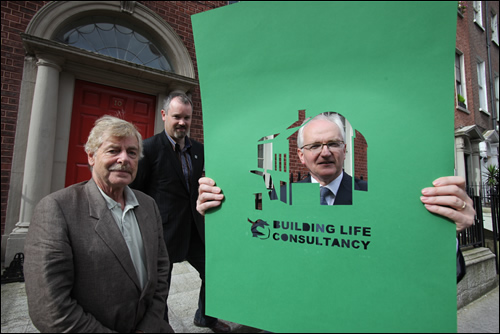- Design Approaches
- Posted
Joseph Little Architects launches sustainable design consultancy

Leading green architect Joseph Little has launched a specialist green design consultancy to assist architects and building companies. On Monday 14 September environment minister John Gormley officially launched Building Life Consultancy, the new initiative of Joseph Little Architects at the company’s offices in North Great George’s St.

Pictured at the launch of Building Life Consultancy are (l-r) RIAI president Sean O’Laoire, Joseph Little, and environment minister John Gormley
Leading green architect Joseph Little has launched a specialist green design consultancy to assist architects and building companies. On Monday 14 September environment minister John Gormley officially launched Building Life Consultancy, the new initiative of Joseph Little Architects at the company’s offices in North Great George’s St.
The innovative initiative, Building Life Consultancy, which the minister described as “visionary”, will provide urgently needed technical support to the construction industry to meet the new lower energy and higher performance building standards in the 2010 building regulations and beyond. The minister recognised that it was a time of crisis for the construction industry and this coupled with higher standards means the challenge ahead for the industry was “immense.” Acccording to Joseph Little, the services that Building Life Consultancy has developed can help and support hard-pressed architects and building companies.
“I strongly believe that a step change is needed in the industry to meet the ambitious and necessary standards in new buildings but also in the renovation sector, which is more important than ever in the current economic climate,” he said. “At least one million homes of Ireland’s 1.7 million housing stock are in need of retrofitting to meet the national energy efficiency target of 2020.
“This significant challenge will cause some conventional forms of construction to be abandoned and require significant re-training of architects, specifiers and builders,” he said. “Ireland is literally facing a new culture in construction. Better sealed buildings will have lower air leakage and with that comes an absolute necessity of installing whole building ventilation systems and using low VOC finishes to safeguard occupant health. These are just a few examples of the kind of change that are necessary in the industry.”
Little emphasised that awareness of new technologies and design methodologies, higher quality work, greater detailed evaluation of all components and a greater understanding of building physics will be key in meeting the new and future standards. “Our new services are uniquely equipped to meet that need,” he said. “They can plug-in to any architect practice, building firm or construction system manufacturer and are sufficiently flexible to cater for a once-off assessment or consultation on an entire building project.” Sean O’Laoire, president of the RIAI, described the initiative as “seminal” at this time, as it represents a new model in architectural practice.
Little highlighted a concern in some current renovation practices where compromises are happening. As reported in recent editions of Construct Ireland, one piece of his research proves that the thermal benefits of filling hollow blocks is being over-reported and that this in fact creates an hygrothermically unstable condition and a propensity for mould. While the industry must accept a lead role in reducing Ireland’s energy use and carbon impact, its manufacturers, architects and builders need to create, specify and build in a way that safeguard Ireland’s building and people. “These issues are not being talked about,” he said. “They need to be talked about not only for the industry but for people’s well-being.”
It’s fair to say that architects and construction companies are at the coal-face and face what may seem a daunting responsibility to create lower energy, higher performance and healthy buildings. Specialist services like Building Life Consultancy offer expert knowledge, technical know-how and the latest analysis tools to help and support the industry in meeting that responsibility.
Last modified on Tuesday, 15 September 2009 11:20

